In the first chapter of For Exposure: The Life and Times of a Small Press Publisher I describe my pre-teen Friday nights with my dear ol’ Mom. She’d set aside these evenings as “Family Movie Time.” Each week she and I would trek to the local video rental store to find the latest offerings of horror movies.
Why did she let her ten-year-old boy watch movies such as The Exorcist and The Howling? My best guess is she wanted the company, as my dad worked in the coal mines 60 to 70 hours a week. Whether or not this was the case, movie time with Mom greatly shaped my entertainment tastes, even to this very day. Thinking back on those movie nights with Mom, there are two movies that still stand out for me, George Romero’s Night of the Living Dead and John Carpenter’s The Thing. Both are outstanding films. Both are relentlessly dark with denouements that will punch you in the gut with despair. The visceral emotions I felt as a kid still affect me as an adult.
Contemporary literature is filled with grim classics that reward readers with incredibly imagery, thoughtful plots, and a penchant for making you look at your fellow human beings and think “Jesus, you lot are terrible!” Included below are five books that will entertain and drop you into the depths of despair.
The Handmaid’s Tale by Margaret Atwood
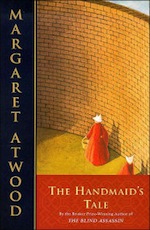 Women are subjugated by a patriarchal society. They are used for menial chores and propagation. Our protagonist, Offred, can remember the days of freedom, and longs to find an escape. As the book moves forward, Offred becomes more desperate and depressed.
Women are subjugated by a patriarchal society. They are used for menial chores and propagation. Our protagonist, Offred, can remember the days of freedom, and longs to find an escape. As the book moves forward, Offred becomes more desperate and depressed.
“I know why there is no glass, in front of the watercolor picture of blue irises, and why the window opens only partly and why the glass in it is shatter-proof. It isn’t running away they’re afraid of. We wouldn’t get far. It’s those other escapes, the ones you can open in yourself, given a cutting edge.”
Not a fun read, but thought-provoking, heartbreaking, and a siren’s call that we need to remain vigilant when it comes to equal rights for all.
Blood Meridian, or The Evening Redness in the West by Cormac McCarthy
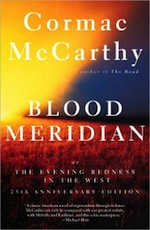 Frankly, I could fill this list with at least two more McCarthy novels: No Country for Old Men and The Road. But Blood Meridian is the most interesting of the three to me. The threadbare plot follows fourteen-year-old ‘The Kid’ as he travels through the wilds of Mexico with the scalp hunters John Joel Glanton and the monstrous Judge Holden.
Frankly, I could fill this list with at least two more McCarthy novels: No Country for Old Men and The Road. But Blood Meridian is the most interesting of the three to me. The threadbare plot follows fourteen-year-old ‘The Kid’ as he travels through the wilds of Mexico with the scalp hunters John Joel Glanton and the monstrous Judge Holden.
“The men as they rode turned black in the sun from the blood on their clothes and their faces and then paled slowly in the rising dust until they assumed once more the color of the land through which they passed.”
Some critics cite Blood Meridian as the pinnacle of contemporary fiction. Naturally, that is a debatable stance. But McCarthy’s novel stands as an incredible indictment of senseless violence, in particular, those acts of evil committed in the name of America and Christianity. The Judge will haunt your dreams for weeks after you finish the last page.
The Girl Next Door by Jack Ketchum
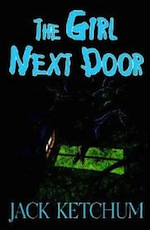 There are few books and movies that I cannot revisit for a second read or second viewing. The Girl Next Door is one of them. The Amazon synopsis says all you need to know about the plot:
There are few books and movies that I cannot revisit for a second read or second viewing. The Girl Next Door is one of them. The Amazon synopsis says all you need to know about the plot:
A teenage girl is held captive and brutally tortured by neighborhood children. Based on a true story, this shocking novel reveals the depravity of which we are all capable.
And when the synopsis states that the book is based on a true story, it isn’t exaggerating. The book holds uncomfortably close to the actual events in the murder of Sylvia Likens.
The Deep by Nick Cutter
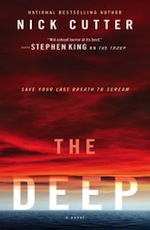 In Cutter’s follow up to the incredible The Troop, we are taken to the deepest parts of the ocean, the Mariana Trench. A mysterious plague called the ‘Gets is killing humanity. The protagonist’s brother, the world’s leading scientific researcher, is sent to Mariana Trench in search of a miracle cute hailed as ‘ambrosia’. But the brother and the two other men sent seven miles below the surface have stopped communicating and the protagonist is sent to investigate.
In Cutter’s follow up to the incredible The Troop, we are taken to the deepest parts of the ocean, the Mariana Trench. A mysterious plague called the ‘Gets is killing humanity. The protagonist’s brother, the world’s leading scientific researcher, is sent to Mariana Trench in search of a miracle cute hailed as ‘ambrosia’. But the brother and the two other men sent seven miles below the surface have stopped communicating and the protagonist is sent to investigate.
The Deep begins with this opening sentence: “The old man’s head was covered in mantises.”
Things get no better. This is the most claustrophobic novel I’ve ever read. And if you’re looking for any hope for humanity in the pages of The Deep, then close this book and look elsewhere.
The Sparrow by Mary Doria Russell
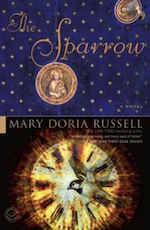 Perhaps the most heartbreaking and most powerful genre novel I’ve read. Russell’s novel is the perfect encapsulation of using genre trappings to express ideas regarding how one culture’s well-meaning interference and views can be seen as horrifying and devastating.
Perhaps the most heartbreaking and most powerful genre novel I’ve read. Russell’s novel is the perfect encapsulation of using genre trappings to express ideas regarding how one culture’s well-meaning interference and views can be seen as horrifying and devastating.
“See that’s where it falls apart for me!” Anne cried. “What sticks in my throat is that God gets the credit but never the blame. I just can’t swallow that kind of theological candy. Either God’s in charge or he’s not…”
Unlike the other books I’ve listed, The Sparrow doesn’t end on a despairing note. The Jesuit priest who suffers the most has an enduring faith, giving the reader some degree of hope. Even so, his ordeal will change the way you see the world.
The beauty of these depressing novels is that each is a classic in their own right. They are thoughtful, entertaining, and have something to say about the human condition.
What are some of your favorite depressing works? Share in the comments. I look forward to your suggestions!
Born the son of an unemployed coal miner in a tiny Kentucky Appalachian villa named Big Creek (population 400), Jason Sizemore fought his way out of the hills to the big city of Lexington. He attended Transylvania University (a real school with its own vampire legend) and received a degree in computer science. Since 2005, he has owned and operated Apex Publications and Apex Magazine. He is the editor of five anthologies, author of Irredeemable and For Exposure: The Life and Times of a Small Press Publisher, a three-time Hugo Award loser, an occasional writer, who can usually be found wandering the halls of hotel conventions.










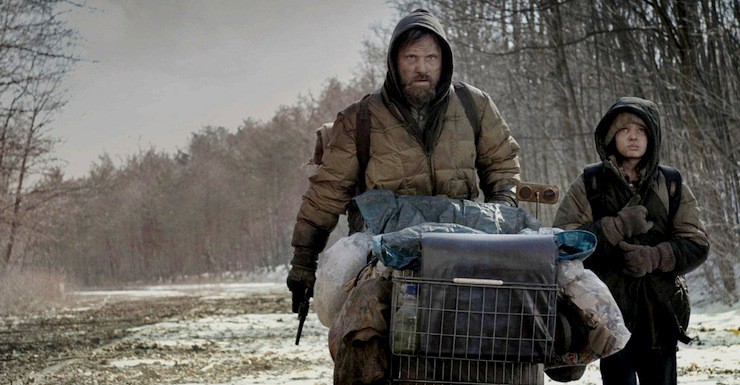
I read Kirby Crow’s Hammer and Bone last week during my lunch hours and wound up crying in the parking lot. Amazingly bleak but redeeming all the same.
That Jack Ketchum novel sounds very similar to the novel LET’S GO PLAY AT THE ADAMS’ by Mendal Johnson, which came out some time in the mid-1970s. In it, some kids tie their babysitter to a bed while she’s sleeping, then invite their friends over to “play.” The parents are away for a week, and the nearest house is a half-mile away. It gets just as horrific as you might think.
Here I see a picture from the movie The Road and figure that would be in the list, it fits for sure!
The Girl Next Door movie adaptation was quite the disturbing movie, and I need to get my hands on the book, and yes, the premise is similar to Let’s Go Play At The Adams, and both are loosely based on real events that took place (in the ’50s?).
Solid list of books – read Handmaid’s Tale in highschool and recall enjoying it, and own Blood Meridian (kobo format), and The Deep, just have not got to them yet.
Requiem for a Dream is just horrifyingly bleak.
Starfish, by Peter Watts.
Actually, the entire Rifters trilogy by Peter Watts.
Actually, almost everything by Peter Watts.
I was also reminded of Let’s Go Play At The Adams. Unsurprisingly, it’s stuck in a lot of readers’ minds.
John Brunner always tended towards the grim, but his magnum opus of grimsome grimness was surely eco-catastrophe novel The Sheep Look Up. Unfortunately, kind of like Lou Reed’s album Berlin, it laid on the misery so thick that at a certain point you just had to laugh. It’s a risk with super-dystopias – or maybe I’m just too cynical. The film version of Requiem For A Dream had that effect on me too, but maybe the book was less heavy-handed.
Brave New World depressed me so much I felt physically sick
for quite some time after finishing it.
And Flowers for Algernon by Daniel Keyes also gets me down.
I was going to say anything by Peter Watts but @5 posted first. I also need to mention that plenty of James Tiptree’s stories could not be considered upbeat, especially “The Screwfly Solution”.
You missed the grandmother of all bleak tales, The Last Man, by Mary Shelley.
@8: Jane Smiley’s novel, A Thousand Acres, is also based on King Lear, from the POV of one of the estranged daughters. Who has excellent reasons for estrangement. An unsparing depiction of the unraveling of a family and a community, through their own failings and through forces beyond their control.
Waiting for the Barbarians, by J. M. Coetzee. Beautifully written, and never ever will I read it again.
Shirley Jackson’s Hangsaman- an ordinary young woman leads an ordinary 1950’s college-freshman life, but as you read, you find yourself struggling to breathe under the weight of everything known that can’t be spoken and all the truths that may be false. A deeply unsettling book. Also, Wide Sargasso Sea by Jean Rhys; a very bleak look at colonialism, race and gender from the point of view of Mr. Rochester’s Mad Wife In The Attic.
Olivia Butlers’s “Earthseed” books, Parable of the Sower and Parable of the Talents, are a depressingly convincing description of a possible near future when everything just falls apart. There’s an indication that at least some people will escape into space and found a new and better world, but that’s no consolation for the trashing of the old world, if you ask me. Likewise, A Canticle for Leibowitz, by Walter M. Miller Jr.
Anything by Stephen King. Every time I’ve read one of his books, I wished I hadn’t.
THIS IS MAN by Premo Levi, ALL QUIET ON THE WESTERN FRONT by Erich Maria Remarque. THE BELL JAY Sylvia Plath. THE BOOK OF DISQUIET Fernando Pessoa. NATIVE SON Richard Wright
Lord of the Flies by William Golding in which a group of prepubescent English boys are stranded on an island with no adults, and despite the efforts of some their behaviour degenerates into barbarism. It was an assigned text at school which I found so disturbing I made myself sick so I wouldn’t have to go to school the day we were due to go and see the first film of it.
I don’t think Blood Meridian was that bad, apart from the bloody atrocities, I think the Kid manages to survive. I wrote a review here https://edlear30.wordpress.com/2015/05/31/book-review-blood-meridian/
I haven’t read Catch 22 yet, but imagine the despair is pretty central.
This is Man Primo Levo simply defines categorisation, he’s almost surgical and godlike in his ability to express the suffering of his experience during the holocaust. It’s nonfiction, but like Capote’s In Cold Blood, written in a prose that conveys emotion and humanity.
All Quiet on the Western Front is simply terrifying as it shows the graphic horror of WW1 from the experience of a young idealistic boy soldier. Like Saving Private Ryan, Come and See and Platoon, it contains beauty and horrors of war.
The Bell Jar and Native Son both contain the tragic failures of adolescent, similar to the manic depressive mental state of Holden Caulfield in Catcher in The Rye, these two books show the flipside of Caulfield’s self-hate, affluence and loneliness, from the point of view of a young girl and a black teenager. Interestly, Caulfield’s self-elected destruction contrasts with the plight if these other two characters. There’s a scene in Native Son, a white girl tries to convince the boy that it’s for them to be friends, and he’s completely terrified of her, which actually made me cry I thought it was sad.
Book of Disquiet, the author was a Portogese poet in Lisbon, and this was apparently his only novel. Which I’d never finished simply because I found the language and disconnected narrative of the central character almost incoherent and insane. I managed to get about half-way, but this strange modernist text assembles collection of diary entries from a lowly office worker, who resembles a Kafkaeque agitator or The Outsider from Albert Camu’s novel. The language is beautiful and devastating as he goes to work everyday, longs for death and dreams of what love must feel like. He’s a character who feels as if his life has already ended, and watching the conveyor belt of workers moving through the city. His like ‘I am the shipwreck of all my wanderings’ will always stay with me.
The Collector by John Fowles, absolute MUST READ, one story told in typical Fowles slight of hand from two different perpectives, both in tandem, allowing the reader to digest the story first from the victim and then the villian. A bright young college is kidnapped by a lonely repressed office worker after he wins the lottery. He keeps her prisoner in a small room, and won’t let her leave until she falls in love with him. Very dark, strange and morbiddly fascinating.
Things Fall Apart by Chinua Achebe. A novel about African folklore and tribes before the arrival of British colonialists, kindof reminded me of Apocalypto and Trainspotting, since although it’s written in English, the plot and story is entirely about African culture. Engrossing, and the scene where the angry father kills the adopted son he loves just because the villagers thinks he’s cursed made genuinely sick with despair.
A Grain of Wheat Ngugi wa Thiong’o. Another story about South African communities destroyed by colonialism and the apartite during the 60s. I can’t remember the whole story, but a scene at the end where the village has a carnival to celebrate the victory of the Mau Mau, and ask a village hero to give a speech about a rebel who’d been killed in the war, but turns out he’d betrayed him to save his own neck, again is devastating. The grief and desperation of the fake hero is awful as he grapples with both the guilt of his betrayal and the loss of his freedom and culture is utterly compelling.
Most heartfelt and uplifting book I’d read about beauty, life and hope, Alain De Botton Consolidations of Philosophy.
Also, I found Catcher In The Rye and Flowers for Algernon very sad, but also beautiful and uplifting.
Second on the John Brunner, but I’d argue The Sheep Look Up isn’t his bleakest novel.
That would be Total Eclipse. Don’t want to spoil it, but damn, that ending… Put me into a depressed funk for days…
Three words. The Yellow Wallpaper.
The Glass Hammer, by KW Jeter
Thirding The Sheep Look Up.
The Wasp Factory by Iain Banks
Is…one…messed…up…novel.
I found most of Butler’s work so bleak I couldn’t finish it, and the ones I could finish I am not going to read again. They aren’t bad books–I think they’re great actually. But they’re not for me.
The winner, IMO, is The Quiet Earth by Craig Harrison. I saw the movie first. It has a bittersweet open ending in which (ROT13 because if you haven’t seen it yet you won’t want spoilers, trust me) gur cebgntbavfg vf cebonoyl qbbzrq gb n onq qrngu, nyzbfg pregnvayl nybar, naq uvf qrngu znl abg unir nppbzcyvfurq nalguvat–ohg ur fgbccrq ehaavat naq gevrq gb uryc, fb ur tbg fbzr punenpgre qrirybczrag. So, I thought, what neat stuff might be in the book that there wasn’t room for in the movie?
Ohhh boy. See, in the movie, the protagonist wakes up completely alone, realizes that he is seriously, literally, all alone in New Zealand, and wanders the landscape left by vanished humanity uncertain as to whether the people were all raptured by the McGuffin, whether he’s in a coma having hallucinations, or whether he’s dead and in Hell. Eventually he finds two living people and the remains of two others. His relationship with the living people is fraught. So far, so text. But in the text–not gonna spoiler this, because it is so depressing I don’t think anybody should stumble over it–he is in fact dead, in Hell, and cycling through the memories of what put him in Hell, with no redemption.
It’s a well-written book, plus it was an interlibrary loan, but I almost threw the thing at the wall.
Childhood’s End– even worse now that I’m a parent. Especially the moment when George is less sorry for his lies than for his indifference.
Lots of great bleak books suggested! Some I’ve read, some I haven’t. Definitely adding the suggestions to my reading list. Yep, I like downer fiction :)
@13 I don’t agree about the Kid surviving. It’s made very clear that something awful happened to the Kid in the outhouse behind the bar.
MaddAddam Trilogy. Flight Behavior. Cloud Atlas. Fahrenheit 451, though I could only bear to read a small part of it.
…dydstopian and/or apocalyptic stories always scare and despair me, basically.
Tess of the d’Urbervilles: A Pure Woman Faithfully Presented by Thomas Hardy has my personal nickname as The Most Depressing Book Ever. But there are others that squashed my heart, turned my eyes to tributaries, and made me wonder “what’s the point in going on?” Some other people mentioned All Quiet On The Western Front. Also has my vote. Here’s more: Charlotte’s Web, Lady Chatterley’s Lover, Memoirs Of A Geisha, Do Androids Dream of Electric Sheep?
Not horrifying novels, which I know Mr. Sizemore is much enamored with, but definitely depressing. Just my $0.02.
Tim Lebbon’s Noreela books, especially Dusk and Dawn.
And an awful lot of K.J. Parker would fit the bill — am thinking in particular of the first three trilogies (Fencer, Scavenger, Engineer).
‘On the Beach’ is probably the most depressing book I’ve ever read.
‘The Last Ship’ and ‘1984’ are high on the list too.
I found The Last Ship less depressing than infuriating. It might as well have been subtitled How One Doofus Almost Doomed the Remnant of the Human Race, or Why Ships’ Captains Ought to Have People Skills, Dammit.
I don’t read many depressing novels. I really don’t like them, but Gillian Flynn’s books make me want to take a shower afterwards.
So many heart-wrenching classics…most of which I was exposed to in high school it seems. Brave New World and Lord of the Flies were probably my first introduction to just downer endings…Actually I’ll throw Where the Red Fern Grows into that as well: I know it’s supposed to be uplifting but when you’re 12 or so and read what happens to the dogs there’s not much an author can say afterward to cheer you up.
If we’re talking about books that made me feel their pit of despair though, the king was probably One Day in the Life of Ivan Denisovich by Aleksandr Solzhenitsyn. It’s pretty hard to get through in general because it’s about a single day, but you really feel the bleakness of the gulag, that numb nothingness that grips you at the height of despair when your brain practically turns off the thoughts that make you human as it goes on survival auto-pilot.
Also, for a book where one of the characters is literally in a pit of despair for a good portion of it: Shadow’s Edge by Brent Weeks, the second book in the Night Angel trilogy. The third book ends up pretty uplifting, but that middle one absolutely sucks for a bunch of characters in it, especially Logan.
Chevengur, by Andrei Platonov. Well, most of Platonov’s stories. Redemption is not a word in the Platonov lexicon.
What can be said about a novel where one of the main characters wanders the world, loves machines more than people, except for the little boy who he saves from an abusive “carer” relationship, and the other main character is that self-same little boy, who in the final chapter, drowns himself just as his father did?
Why use a picture from “The Road” and then not talk about it? Uncool.
Random Acts of Senseless Violence by Jack Womack. Disintegration of society from a kid’s view point. The confusion, despair, slide into viciousness and violence to survive…haven’t re read it
Laird Barron’s The Croning did the trick for me. Such a bleak story.
@14: I agree that the implications of Total Eclipse are bleaker than those of The Sheep Look Up, but they are a bit more abstractly expressed. So if you are not convinced by the thesis the book hits you less viscerally. Of course if it does get to you, it is likely to hit you harder.
That may be why some pick Brave New World. I’ve always thought of it as almost unique among major SF dystopias in that the people – or, more realistically, the elites – might well have consciously chosen it, especially given the potted history alluded to by Huxley. It’s not even such a terrible world – the people are not obviously unhappy, there is some scope for future change. Unlike say 1984, it’s a dystopia we could get to (some probably feel the same about eco-dystopias).
Lord of the Flies nearly made the list. As did Brave New World. But I wanted to focus on more contemporary works.
@29: The lead graphic wasn’t my choice.
@@@@@ 25: What depressed me most about ‘The Last Ship’ was that everything seemed like an exercise in futility, but I agree with your assessment too (of course it has been nearly 20 years since I read the book, so take that for what it’s worth).
@32: My personal headcanon is that TXH-1138 takes place in the future of Brave New World, but meanwhile the so-called savages have picked themselves up and gone on with their lives. In one way it’s horribly bleak, but on the other hand, Thex has a chance of being picked up by a patrol of Hatchwatch volunteers who will take him to a halfway house and get him set up for life on the outside.
The Ruins by Scott Smith. Or A Simple Plan, by Scott Smith. Basically, I wouldn’t want to sit next to Scott Smith at a dinner party, although for all I know, he may be a lovely person aside from his writing.
I think we all need a “miracle cute.”
100 Years of Solitude. I couldn’t get out of bed for DAYS after reading it. It was just so heartbreaking and hopeless.
Cry Father by Benjamin Whitmer
Kazuo Ishiguro’s “Never Let Me Go”. Real downer story of individuals destined for a horrible fate, and their depressing acquiescence to it.
THE BELL JAR and AS I LAY DYING
Joe Abercrombie’s First Law trilogy. A series not quite as horrific as the others mentioned above, but it’s universe would shred GoT alive, especially as you discover that the wizard Bayaz, the novel’s kindly-old-wizard analogue, is in fact an immortal sociopath, secretly running and ruining the lives of an entire kingdom.
Demons by Dostoevsky (usually translated as The Possessed). I chuckled when I saw several appearances by The Bell Jar. In my last semester of grad school, we had a Lit. & Philosophy seminar. The Bell Jar was one of the works we had to read. After one assigned reading, the class unanimously revolted against it. The professors caved and assigned something by Virginia Woolf instead.
The Handmaid’s Tale is one of the few books I couldn’t just blow through because I had to stop at several points.
I read both Lord of the Flies and As I Lay Dying in high school – I loved both of them, because at that age I was always in to things that had a bit of a disturbing turn (not because I thought the darkness itself was something to be celebrated, mind you…I just had a kind of True Art is Dark/Disturbing mentality going on).
I recently bread Brothers Karamazov and I had to actually stop for a few weeks – it was around the famous ‘Inquisitor scene’. But it’s definitely worth finishing…I was near tears (in a good way) by the end of the book.
I read the Sparrow in a college course on the history of Christianity. There is a sequel as well.
But I think the most impactful books in recent times had to be Lolita. That was another book I stopped reading for a few weeks because being inside the narrator’s head was just so vile and disgusting. Eventually I pushed through and I really am glad I did. It’s a very unpleasant but also powerful story. And the book ends on what could ambiguously be seen as a hopeful note – unless you remember, as I did, to go back and re-read the ‘foreword’ to see if any of it makes any more sense, and then one of the lines that previously had no meaning at all made me go, ‘oh fuuuuuuuuck!’. Part of me wanted to put the book into a donation bin, but part of me felt that would be yet another case of silencing the fictional eponymous character. I don’t know that I’ll ever reread it though.
On a lighter note, pretty much all Star Wars EU after the New Jedi Order :P
I liked BLOOD MERIDIAN and THE SPARROW. (I need to read CHILDREN OF GOD, the sequel to THE SPARROW someday.) I also liked Cormac McCarthy’s THE ROAD, which you have a picture of the movie, but you don’t review the book. I love SILENCE by Shusako Endo, which Martin Scorsese is making into a movie. If you like THE SPARROW check out SILENCE, which is about a Portuguese Jesuit priest who goes to Japan in the 1700’s and discovers there is a great persecution of Japanese Catholics. He wonders why God is silent in the face of all this suffering. The post nuclear holocaust novel A CANTICLE FOR LEIBOWITZ by Walter M. Miller, Jr. is great. Though, sadly, Miller suffered from depression and post traumatic stress (he was a WWII vet) and committed suicide at the age of 73.
Black Easter, James Blish.
Deliberately unleashing all the demons of hell. And being unable to banish them again.
Anything by Stephen Donaldson, especially the Gap series. Even the endings only redeem so far.
The most depressing without a doubt is ON THE BEACH by Nevil Shute. The depicted end-of-it-all nuclear catastrophe suggest no hope whatsoever. A CHILD OF GOD by Cormac McCarthy also ranks up there.
On the Beach – heck yes. Gap Series, ditto. The Road, Lord of the Flies, more of the same.
Stepping out of genre, how about A Death in the Family by Agee. Relatively young and very hard working and promising father/husband dies in a freak car accident, and the book follows what happens in the wake of the tragedy. Heartbreaking. Or Wuthering Heights. How many lives can Heathcliff ruin. Or Glengarry Glen Ross or Long Days’ Journey into Night if we want to venture into downer dramas. (By the way I disagree about Catch 22. Way too much humor and absurd comedy in it to reach the true depths of hell.)
Outer dark by Cormac McCarthy.
I second Blood Meridian and anything by Peter Watts, preferably Blindsight. In the similar venue, Harmony by Project Itoh. Also, On the Beach and Highwind on Jamaica by Richard Hughes.
Try A Fine Balance, by Rohinton Mistry. http://www.bacononthebookshelf.com/2014/10/23/guest-post-karlen-garrard-on-a-fine-balance/
the prize must go to .journey to the end of the night………by louis ferdinand celine……..others …junky ws borroughs….last exit from brooklyn……nausea…jp sartre……………………
And then there’s Bug Jack Barron by Norman Spinrad, and did I forget The Birth of the People’s Republic of Antarctica by John Calvin Batchelor? Hell on ice …
Kazuo Ishiguro’s “Never Let Me Go” left me feeling deeply saddened & enraged at the injustice the children faced. Narrated by Kathy B. and told in flashbacks the end result of their upbringing is monstrous.
Jude The Obscure is the most depressing book I’ve read. Flight Behaviour by Barbara Kingsolver also left me feeling very bleak.
I agree with everyone who mentioned Flowers for Algernon. Another not-contemporary giant bummer of a book that sprang instantly to my mind was Pearl S, Buck’s The Good Earth. I read it in middle school and when I was done I clearly remember laying on the floor and moaning for a good half hour. Ugh.
Sophie’s Choice by William Styron. As I remember I couldn’t finish The Sparrow.
High Rise by J.G. Ballard.
I can find hope in a lot of dark places (I thought The Road was about the power of optimism)- but High Rise made me truly uncomfortable.
It’s been made into a movie with Tom Hiddleston and Jeremy Irons that may or may not be released this year.
Life After Life was depressing from beginning to end.
You want depressing? The Scalehunter’s Beautiful Daughter by Lucius Shepard ends:
“From that point on little is known of her other than the fact that she bore two sons and confined her writing to a journal that has gone unpublished. However, it is said of her—as is said of all those who perform similar acts of faith in the shadows of other dragons yet unearthed from beneath their hills of ordinary-seeming earth and grass, believing that their bond serves through gentle constancy to enhance and not further delimit the boundaries of this prison world—from that day forward she lived happily ever after. Except for the dying at the end. And the heartbreak in between. “
All’s Quiet on the Western Front, Native Son, and anything a dog dies in are all upsetting. Lovely Bones just about killed me. How has no one mentioned it?! I was depressed for days after reading it. I absolutely loved ‘The Secret History of the Dead’ but that is upsetting too. All of Ann Beattie’s books leave me vaguely depressed.
I never want to read “we need to talk about Kevin” again – my first ever Book group book – I found it deeply disturbing and we read it not long after we had all had kids, however it did at least throw up some good discussion!
Oh, and how could I have forgotten Steven Baxter’s Titan?
Try The Passing Bells by Phillip Rock.
I read it 30 years ago, but it has been reissued since the success of Downton Abbey.
It had me in tears.
Night (Elie Wiesel), Ordinary People (Judith Guest), She’s Come Undone (Wally Lamb),The Jungle (Upton Sinclair),
Nectar in a Sieve (Kamala Markandaya), The Good Earth (Pearl S. Buck), Angela’s Ashes (Frank McCourt) &
Death of a Salesman (Arthur Miller)
The Jungle by Upton Sinclair. I couldn’t finish it. Anything awful that could possibly happen to this naive Lithuanian immigrant family working in Chicago’s meat-packing industry does happen. Exploitation. Amputation of frost-bitten fingers. Loss of jobs, loss of homes, deaths of children. Sexual abuse. On and on.
Manifest Space by Stephen Baxter. The reason we haven’t found evidence of ancient interstellar civilizations is because supernova explosions periodically sterilize the entire galaxy… Like the one that is about to happen.